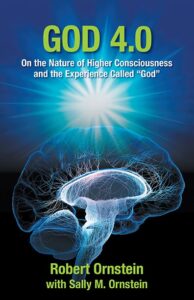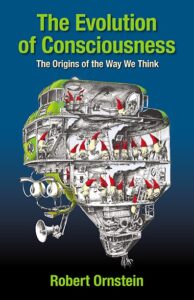The Psychology of Consciousness
New Revised Fourth Edition
Robert Ornstein

Robert Ornstein
“Ornstein is one of the more original thinkers in the fields of neurology and psychology. He has also the advantage of being gifted with the ability to expound difficult ideas simply, as many of the most significant gurus do by means of parables.…”
—The Guardian
“[Ornstein’s] insights are startling, original and certain to change how we think about ourselves and others.”
—Paul Ekman
“…one of the most witty and original psychologists writing today.”
—Booklist
The Psychology of Conscious Evolution Trilogy:
Ornstein’s trilogy of works, The Psychology of Consciousness, The Evolution of Consciousness and God 4.0, provides a fundamental reconsideration of ancient religious and spiritual traditions in the light of advances in brain science and psychology, exploring the potential and relevance of this knowledge to our shared future.
The Psychology of Consciousness
New Revised Fourth Edition
Robert Ornstein
“A fine, fine book, lucid, unsmug, amazingly comprehensive. Reading it I felt over and over again that this was the book I had been waiting for.”
– The New Yorker
The new revised edition of Robert Ornstein’s classic study offers a fresh look at human consciousness and the untapped potential of the human mind
What is consciousness and why do we need to know?
In this new fourth edition of his revolutionary study, Robert Ornstein reexamines what is known about consciousness and why this understanding is so important at this time of enormous challenge, change and potential.
He begins with an exploration of how the human brain evolved as a complex system for limiting what we “pick up” from the vast external environment to just the information we need to survive. We fill in the gaps with “unconscious inferences” — assumptions, categorizations, expectations and habituations that allow us to operate in the world, but that limit our perception of what is, and what is possible.
Going beyond the theory that creative impulses originate in the right side of the brain and rational impulses in the left, he shows how a synthesis of these two functions can bring about “a more complete science of human consciousness with an extended conception of our own capabilities.”
Ornstein proposes that education at all levels should now include learning and teaching about our human nature — the nature of the person being taught. Offering far more than scholarly discourse, he enriches his presentation with thought-provoking illustrations and traditional teachings stories that bring the science to life, giving readers a first-hand taste of what such education might be like.
Only with the development of self-knowledge and the cultivation of a comprehensive, expanded consciousness, he says, will humanity be able to perceive and take the “selfless” steps necessary to solve our collective problems. This new edition comes at a time when on a global scale we need this type of thinking more than ever.
“The Psychology of Consciousness. . . should be read by all students of the mind, including psychiatrists and clinical psychologists . . .a fine text to introduce students to the new ideas that are transforming the study of the mind…”
– Andrew Weil, Psychology Today
“An original and explosive book. It starts out by making psychology, the science of the mind, what it actually is—as exciting and suspenseful as a good mystery story.”
– George B. Leonard
“Ornstein has always been on the frontier of new, speculative thinking about the workings of the mind … No narrow specialist, he uses literature, myth and poetry, not to mention jokes, to illustrate his ideas… Ornstein can describe these ideas so that people without scientific training can grasp them . . . not only informative but entertaining as well.”
– Doris Lessing, winner of the Nobel Prize for Literature














